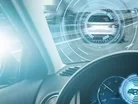Self-Driving Cars Pave the Way to New Insurance Practices

Technology is changing the way people do nearly everything, and the auto industry is no exception. As the future approaches, it has a significant impact on insurance. The increasing integration of technology into everyday life could result in sweeping social changes affecting nearly everyone on the planet - and change is something to bet on.
The advent of autonomy has led to some novel considerations for insurance in a driverless world. One such concern is how insurers will determine liability in an accident with a self-driving car. If they are not required to have drivers or passengers, who will be liable when accidents happen? This post explores this question and more, as it discusses the implications of autonomous vehicles (AV) on insurance practices.
Regulators must reexamine laws for an autonomous world
As the AV industry continues to evolve, leaders are using new terms to categorise these emerging trends. The rise of disruptive advancements has also necessitated liability analysis and led law firms into conversations about who is covered for damages resulting from a technological blunder or another unforeseen issue.
There's a lot of hype about autonomous vehicles, but there's a real chance they won't function as planned without any legislation in place. Data privacy rules might also put auto insurers at odds with their clients over how much personal information should be gathered or shared for these new technologies to succeed.
Insurtech startups will be needed to address data breaches and cyberattacks
Changes in the auto insurance industry are possible as a result of AV development. These changes include the use of telematics devices to track driving behaviour, the possibility of insuring against cyberthreats via software subscription for vehicles, creating new plans for self-driving cars with multiple owners in the sharing economy, and a rise in usage-based insurance policies.
The more data on how to operate AVs is gathered, the greater chance there is for them to be hacked and used in nefarious ways. Car manufacturers will need security protocols similar to those employed by online retailers or corporations, which are frequently targeted by cybercriminals. Insurtech companies could be the answer as they often work with emerging technologies and understand the risks associated with rapidly-changing technology.
Even Tesla, one of the biggest names in automotive engineering with their self-driving cars, has entered the insurance market.
Paving the way for new regulations
New automobile insurance coverage and regulatory models are being developed simultaneously with new AV technology. For example, the Automated and Electric Vehicles Act in the USA is designed to provide a framework for the safe development and operation of AVs while also allowing insurance-related questions to be answered in the process.
As regulators begin to outline technological standards for automated driving systems, the insurance industry develops a framework specifying the primary criteria self-driving cars must meet to be classified as such.
In order for self-driving cars to become mainstream, there is going to have to be some clear legislation passed. In addition, car manufacturers and consumer groups will need to be on board, and insurance companies will need to figure out how to price their premiums.
In a report called 'Regulating Automated Driving,' the Association of British Insurers and Thatcham Research have established the minimum safety standards required before automated driving technology becomes widely utilised.
How will self-driving cars change the insurance industry?
The changes mentioned above will happen over a period of time, but no one knows when. Autonomous vehicles are expected to alter the auto-insurance industry and open doors for investors with innovative ideas like insurtech products to help them retain customers in the marketplace.
New concerns for insurance have emerged in an increasingly autonomous world. However, there is still much work to be done before everyone is riding around in self-driving cars. Nevertheless, one thing is for sure; insurers and insurtech companies will have a significant responsibility in whatever lies ahead for autonomous driving.
Featured Articles
Pipe’s underwriting model sees 98% offer acceptance globally, expanding its reach to new markets with seamless financial solutions
Absa Life implements Sapiens suite across funeral business as foundation for AI-driven expansion
Markel's fintech insurance chief warns of rising synthetic fraud as 79% of UK firms lose £500K+, with new regulations shifting liability to providers




